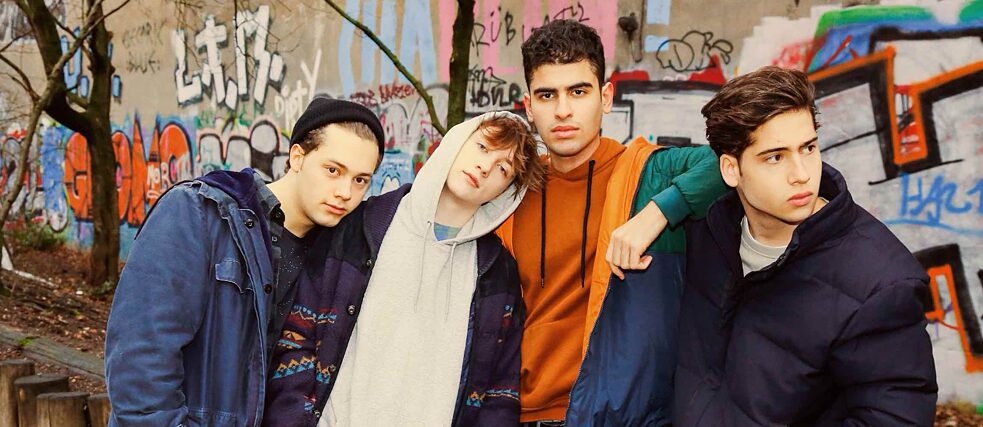Young Adult Series “Druck”
“A little flippant and imperfect”

“Druck” (Pressure) is a young adult television series that features authentic actors and dialogue. Most of the actors are amateurs, and the transgender character is played by a trans man. The show has been a run-away success.
By Lucas Barwenczik
Druck (Pressure) is a new, successful German television series for young adults. It tells the stories of a group of teens about to graduate from secondary school. Launched in March 2018, the public television show is not only available on classic television channels and online media libraries. Viewers can also follow the series on ZDFNeo, ZDF and ARD’s “funk” platform and Youtube, where it has racked up more than 60 million views.
Druck’s fans value the realistic portrayals of the mostly unknown and so all the more authentic actors, like the trans man who plays a transgender character. We talked to Pola Beck, who has directed many episodes, and Julia Penner, the head writer of season 3 and co-head writer of season 4, about how the actors were chosen, how fan feedback gets incorporated into the series, and what other shows could learn from it.
“Druck” has an international fan base. How has the series won over viewers outside of Germany, which most other German have failed to do?
Beck: The show is based on Skam, an original series from Norway, andSkamfans were curious about the German adaptation. The LGBTQ community has also helped to spread the word - there aren’t many series that depict the teen transgender experience. People are eager to find a series that represents them, especially when it takes an honest and realistic approach to important issues.
How important was authenticity when casting the actors and creating the characters?
Beck: Extremely. Most of the actors are not professionals, and we cast many of them because they shared qualities with a character.
Penner: We also did workshops where the actors took a really deep dive into their roles and internalized them. There is an element of typecasting, but it would be very different if they were just playing themselves. I don’t think they would be as good.
Beck: I think part of our success is that the acting is not perfectly crafted. The actors bring a bit of themselves into their roles; it is a little flippant and imperfect. The way they talk is also inspired by the actors. The third season is about a transgender experience, and we deliberately cast a trans man to play the part: Lukas Alexander. One of my favourite scenes this season is when his character, David, comes out and says to his friend Matteo, “I’m a boy; I just have to work a little harder at it.” A heartbreaking sentence Lukas wrote in this case. That doesn’t mean that the actors dictate the dialogue to us; it is more of a productive back and forth.
 Trans character David comes out to his friend Matteo (right) and others: “I’m a boy; I just have to work a little harder at it.”
| © ZDF/Bantry Bay/Gordon Muehle
Is the idea to turn the overall series landscape into more of a collaborative medium so you can better narrate specific identities and positions?
Trans character David comes out to his friend Matteo (right) and others: “I’m a boy; I just have to work a little harder at it.”
| © ZDF/Bantry Bay/Gordon Muehle
Is the idea to turn the overall series landscape into more of a collaborative medium so you can better narrate specific identities and positions?
Penner: From a writer’s perspective, the workshops are very useful. It helps you tailor the writing to the characters more. We have sometimes come up with a scene and tried it out in improvisation. It has been so amazing, and we would like to continue it in other formats and subjects. But that depends on the project too, of course.
You get a lot of feedback on the internet, especially from the LGBTIQ community. Does feedback from the fans change the series in any way?
Penner: In season 3, we wrote David as a trans character because a fan started a petition saying it would be great to have this character be trans. So definitely at times.
Beck: Fans discuss the series on social media and we incorporate the feedback into our conversations. We talk about how to respond if something has been misinterpreted or negatively received. Initially it didn’t happen that often, but at some point it just became part of the process.
Penner: We don’t take every suggestion on board, of course. We got a lot of requests to make Amira lesbian in season 4, but we decided against it.
The protagonists are from Generation Z. Do you think they are different from the generations that came before, or are the worries of teenagers timeless and universal?
Beck: Some things are universal, of course. But I think the audience has become more open, at least as far as LGBTQ issues are concerned.
Penner: There is definitely more openness and visibility. My overall sense is that this generation helps each other more. This is also reflected in movements like “Fridays for Future”.
So are you saying it is a particularly politically active generation?
Beck: It's funny that the first season opened with a monologue about how apolitical this generation is. That aired in March 2018. And now, a year and a half later, so many amaz8ing things have happened.
The fourth season is currently airing. What are your hopes for the future of the series?
Beck: I want the series to continue to be courageous and forge new paths, whatever may come.